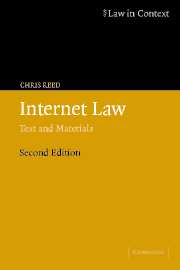Book contents
- Frontmatter
- Contents
- Preface
- Table of UK Statues
- Table of statutes–foreign jurisdictions
- Table of European Communities legislation
- Table of Conventions and Agreements
- Table of cases
- Introduction
- 1 The Internet as a distributed environment
- 2 From each according to his ability : actors and activities in the Internet world
- 3 An infinity of scarce resources : ownership and use of Internet resources
- 4 New actors on a new stage : intermediary liability in the Internet world
- 5 On the Internet, nobody knows you're a dog: identity and identification
- 6 Old wine in new bottles : traditional transactions in the Internet environment
- 7 The long arm of the law : cross-border law and jurisdiction
- 8 Legislative and regulatory arbitrage
- 9 Enforceability in the Internet environment
- 10 Facing the legislative and regulatory challenge
- Index
8 - Legislative and regulatory arbitrage
Published online by Cambridge University Press: 05 June 2012
- Frontmatter
- Contents
- Preface
- Table of UK Statues
- Table of statutes–foreign jurisdictions
- Table of European Communities legislation
- Table of Conventions and Agreements
- Table of cases
- Introduction
- 1 The Internet as a distributed environment
- 2 From each according to his ability : actors and activities in the Internet world
- 3 An infinity of scarce resources : ownership and use of Internet resources
- 4 New actors on a new stage : intermediary liability in the Internet world
- 5 On the Internet, nobody knows you're a dog: identity and identification
- 6 Old wine in new bottles : traditional transactions in the Internet environment
- 7 The long arm of the law : cross-border law and jurisdiction
- 8 Legislative and regulatory arbitrage
- 9 Enforceability in the Internet environment
- 10 Facing the legislative and regulatory challenge
- Index
Summary
Arbitrage, in the financial markets, is the process of finding a difference in pricing between two counterparties and exploiting the differential for profit. Arbitrage in terms of law and regulation is a very similar process, and consists of locating a commercial activity (or part of it) in a jurisdiction which confers advantages, while continuing to do business in other jurisdictions without being subject to the burdens which those jurisdictions impose on local businesses. This phenomenon is well-known already in the field of taxation, and many corporations locate their head offices in tax havens (usually small islands with favourable climates).
However, the opportunities for legislative and regulatory arbitrage are limited for physical world businesses. The need for a sales force and physical distribution infrastructure usually subjects the business to the laws and regulations of the jurisdictions in which it has customers. This is not true for Internet activities. In particular, where the business is dealing in information products it will often be able to adopt a distributed business model (see Chapter 2.4) and locate the different elements in multiple jurisdictions. This can create two main types of arbitrage advantage:
Decreased overheads, eg because lower taxes are payable or a reduction in the cost of complying with supervisory regimes.
Avoidance of restrictions on, or in extreme cases prohibition of, certain activities.
- Type
- Chapter
- Information
- Internet LawText and Materials, pp. 269 - 290Publisher: Cambridge University PressPrint publication year: 2004

